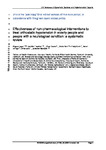Effectiveness of non-pharmacological interventions to treat orthostatic hypotension in elderly people and people with a neurological condition
| dc.contributor.author | Logan, A | |
| dc.contributor.author | Freeman, J | |
| dc.contributor.author | Pooler, J | |
| dc.contributor.author | Kent, B | |
| dc.contributor.author | Gunn, H | |
| dc.contributor.author | Billings, S | |
| dc.contributor.author | Cork, E | |
| dc.contributor.author | Marsden, J | |
| dc.date.accessioned | 2020-09-18T13:56:53Z | |
| dc.date.available | 2020-09-18T13:56:53Z | |
| dc.date.issued | 2020-09-09 | |
| dc.identifier.issn | 2689-8381 | |
| dc.identifier.issn | 2689-8381 | |
| dc.identifier.uri | http://hdl.handle.net/10026.1/16395 | |
| dc.description | Acceptance date approximate, given by author. | |
| dc.description.abstract |
OBJECTIVE: The objective of this review was to summarize the best available evidence regarding the effectiveness of non-pharmacological interventions to treat orthostatic hypotension (OH) in elderly people and people with a neurological condition. INTRODUCTION: Orthostatic hypotension is common in elderly people and people with a neurological condition and can interfere with or limit rehabilitation. Non-pharmacological interventions to treat OH could allow for longer and earlier mobilization, which is recommended in national clinical guidelines for rehabilitation in the acute or sub-acute phase following stroke or other neurological conditions. INCLUSION CRITERIA: The review considered people aged 50 years and older, and people aged 18 years and elderly people with a neurological condition. Non-pharmacological interventions to treat OH included compression garments, neuromuscular stimulation, physical counter-maneuvers, aerobic or resistance exercises, sleeping with head tilted up, increasing fluid and salt intake, and timing and size of meals. The comparator was usual care, no intervention, pharmacological interventions, or other non-pharmacological interventions. Outcome measures included systolic blood pressure, diastolic blood pressure, heart rate, cerebral blood flow, observed/perceived symptoms, duration of standing or sitting in minutes, tolerance of therapy, functional ability, and adverse events/effects. METHODS: Databases for published and unpublished studies available in English up to April 2018 with no lower date limit were searched. Critical appraisal was conducted using standardized instruments from JBI. Data were extracted using standardized tools designed for quantitative studies. Where appropriate, studies were included in a meta-analysis; otherwise, data were presented in a narrative form due to heterogeneity. RESULTS: Forty-three studies - a combination of randomized controlled trials (n = 13), quasi-experimental studies (n = 28), a case control study (n = 1), and a case report (n = 1) - with 1069 participants were included. Meta-analyses of three interventions (resistance exercise, electrical stimulation, and lower limb compression bandaging) showed no significant effect of these interventions. Results from individual studies indicated physical maneuvers such as leg crossing, leg muscle pumping/contractions, and bending forward improved orthostatic hypotension. Abdominal compression improved OH. Sleeping with head up in combination with pharmacological treatment was more effective than sleeping with head up alone. Eating smaller, more frequent meals was effective. Drinking 480 mL of water increased blood pressure. CONCLUSIONS: The review found mixed results for the effectiveness of non-pharmacological interventions to treat OH in people aged 50 years and older, and people with a neurological condition. There are several non-pharmacological interventions that may be effective in treating OH, but not all have resulted in clinically meaningful changes in outcome. Some may not be suitable for people with moderate to severe disability; therefore, it is important for clinicians to consider the patient's abilities and impairments when considering which non-pharmacological interventions to implement. | |
| dc.format.extent | 2556-2617 | |
| dc.format.medium | ||
| dc.language | en | |
| dc.language.iso | en | |
| dc.publisher | Ovid Technologies (Wolters Kluwer Health) | |
| dc.subject | elderly | |
| dc.subject | older adults | |
| dc.subject | neurological condition | |
| dc.subject | non-pharmacological treatment | |
| dc.subject | orthostatic hypotension | |
| dc.title | Effectiveness of non-pharmacological interventions to treat orthostatic hypotension in elderly people and people with a neurological condition | |
| dc.type | journal-article | |
| dc.type | Review | |
| plymouth.author-url | https://www.ncbi.nlm.nih.gov/pubmed/32773495 | |
| plymouth.issue | 12 | |
| plymouth.volume | Publish Ahead of Print | |
| plymouth.publication-status | Published online | |
| plymouth.journal | JBI Evidence Synthesis | |
| dc.identifier.doi | 10.11124/jbisrir-d-18-00005 | |
| plymouth.organisational-group | /Plymouth | |
| plymouth.organisational-group | /Plymouth/Faculty of Health | |
| plymouth.organisational-group | /Plymouth/Faculty of Health/School of Health Professions | |
| plymouth.organisational-group | /Plymouth/Faculty of Health/School of Nursing and Midwifery | |
| plymouth.organisational-group | /Plymouth/REF 2021 Researchers by UoA | |
| plymouth.organisational-group | /Plymouth/REF 2021 Researchers by UoA/UoA03 Allied Health Professions, Dentistry, Nursing and Pharmacy | |
| plymouth.organisational-group | /Plymouth/Research Groups | |
| plymouth.organisational-group | /Plymouth/Research Groups/FoH - Applied Parkinson's Research | |
| plymouth.organisational-group | /Plymouth/Research Groups/Institute of Health and Community | |
| plymouth.organisational-group | /Plymouth/Research Groups/Plymouth Institute of Health and Care Research (PIHR) | |
| plymouth.organisational-group | /Plymouth/Users by role | |
| plymouth.organisational-group | /Plymouth/Users by role/Academics | |
| plymouth.organisational-group | /Plymouth/Users by role/Researchers in ResearchFish submission | |
| dc.publisher.place | United States | |
| dcterms.dateAccepted | 2020-07-10 | |
| dc.rights.embargodate | 2021-9-9 | |
| dc.identifier.eissn | 2689-8381 | |
| dc.rights.embargoperiod | Not known | |
| rioxxterms.funder | National Institute for Health Research | |
| rioxxterms.identifier.project | A feasibility study to investigate the effects of a functional standing frame programme in people with severe sub-acute stroke on function, quality of life and neuromuscular impairment; and a systematic review on non-pharmacological interventions for orthostatic hypotension | |
| rioxxterms.versionofrecord | 10.11124/jbisrir-d-18-00005 | |
| rioxxterms.licenseref.uri | http://www.rioxx.net/licenses/all-rights-reserved | |
| rioxxterms.licenseref.startdate | 2020-09-09 | |
| rioxxterms.type | Journal Article/Review | |
| plymouth.funder | A feasibility study to investigate the effects of a functional standing frame programme in people with severe sub-acute stroke on function, quality of life and neuromuscular impairment; and a systematic review on non-pharmacological interventions for orthostatic hypotension::National Institute for Health Research |


